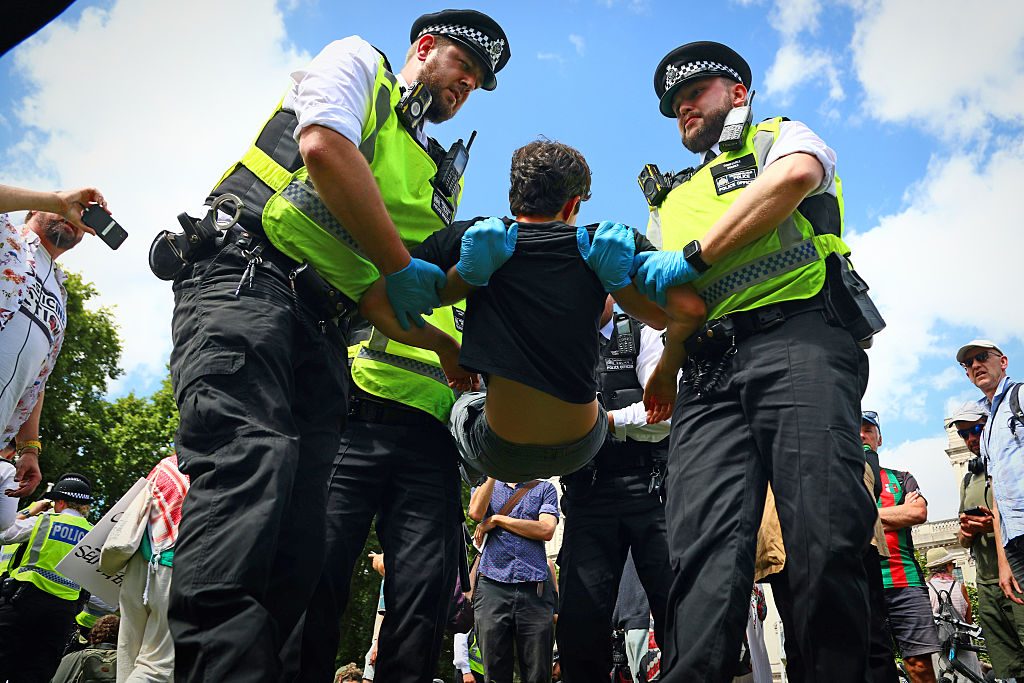Westminster, London
As Big Ben’s dial moved towards one, police officers massed beside a statue of David Lloyd George. Above them, his outstretched arm gestured towards the assembled mass in Parliament Square preparing to breach terror legislation by declaring their support for Palestine Action.
The protest, organisers Defend Our Juries had declared in a briefing document, was intended to expose the “absurdity” of the campaign group’s proscription. Charging and prosecuting the 500 activists who had pledged to take part was likely to be beyond the capacity of the British state, they claimed. While the risk of arrest was substantial, only three of the 200 sign-holders arrested so far had been charged with an offence.
For Michelle Sedgebeer, being detained was a small price to pay compared to what those in Gaza are suffering. Jail, she said, would be “six months of inconvenience”. Unlike Palestinians held in Israel’s Sde Taiman facility, she would at least not face the threat of rape by guards.
“I don’t want to go to prison,” she said. “But people in Gaza don’t wake up and say they want to die — sometimes we don’t have a choice.” While her arrest would prove catastrophic for her immediate family, they would have to cope, she said. With conditions worsening in Palestine, the 60-year-old had decided on Thursday she had a duty to take part in the protest. “Genocide has always been Israel’s intent. People are now horrified because children are starving but it takes a long time for a famine to develop. They say the children starving have pre-existing conditions but of course the most vulnerable will die first.”
Across Parliament Square, an elderly couple were sitting with blank signs and thick marker pens. As per the guidance provided by Defend Our Juries, the pair were ready to write “I oppose genocide. I support Palestine Action” when it reached one o’clock. These words had been carefully designed: organisers believe they can only be taken as personal support for a terror group, an offence which carries a significantly lower penalty than encouraging others to join one.
“Our democracy is at stake,” said the wife, who declined to give her name. “Palestine Action is a group that has resisted the government and expressed disagreement with arming Israel.”
Did the group’s campaign of vandalism not go beyond expressing disagreement? “I have lived through the Troubles and the IRA pub bombing campaign, the London bombings in the ‘90s and 9/11,” her husband insisted, a solicitor’s phone number scrawled in ink across his hand. “I have seen terrorism and Palestine Action is not terrorism. Spraying paint on a plane is not terrorism.”
After forming neat lines around the square, the police began to approach protesters one-by-one. At the protest’s edge, two officers stood over an elderly lady and watched as she finished spelling out her support for Palestine Action before tilting her placard up towards their faces. At this, they stepped forward, read out her rights and arrested her.
What followed was a formula to be repeated throughout the day. With demonstrators typically refusing to walk to a police van, several officers were required to hoist the offender to their feet, giving enough time for a dense and angry crowd to form around them.
“Shame on you,” shouted activists. “Who do you serve?” “Go back to Wales and do something useful,” yelled one at the officers drafted in from across the border to provide support.
By six o’clock, at least 365 protesters had been arrested, according to the Metropolitan Police. On top of a pile of discarded signs lay a copy of 1984. While some of those carried into police vans were young, most of those detained were elderly, with less to lose from a terror conviction. “It would be an honour to be arrested,” said Maeve, who had flown in from Belfast on a one-way ticket.
At times, officers seemed confused as to what was an arrestable offence. At its most absurd, this saw one Zionist counter-protester handcuffed because his sign, condemning the protest and Hamas, contained the words “Palestine Action”. Upon explaining the mistake, he was released.
As the arrests mounted, one retired ambulance worker holding a “STOP ARMING ISRAEL” placard said he believed the demonstration had achieved its aim. He used to be patriotic, he told me, but had now opened his eyes. “The government has chosen to stifle people’s right to protest. I would urge every police officer to read their Peel Values — if the police lose the public they’re lost, if the public loses the police we’re lost.”
But, he added, in some respects the victory felt hollow. “For all of these young people, being arrested will affect their job prospects. What are we saying? It’s just sad.”











Join the discussion
Join like minded readers that support our journalism by becoming a paid subscriber
To join the discussion in the comments, become a paid subscriber.
Join like minded readers that support our journalism, read unlimited articles and enjoy other subscriber-only benefits.
Subscribe